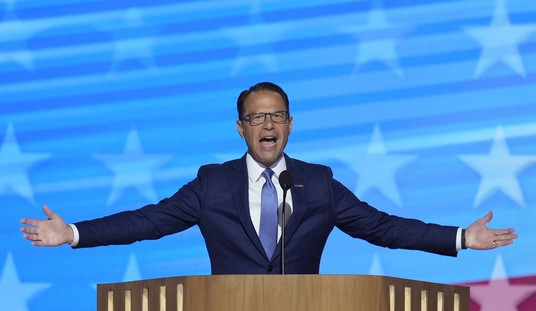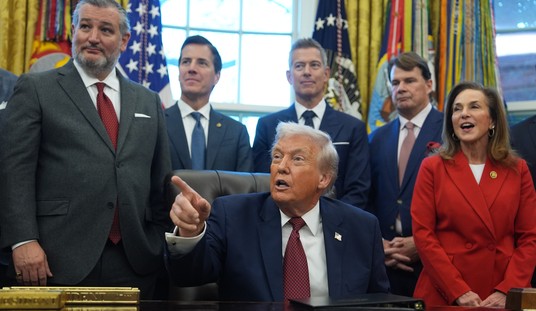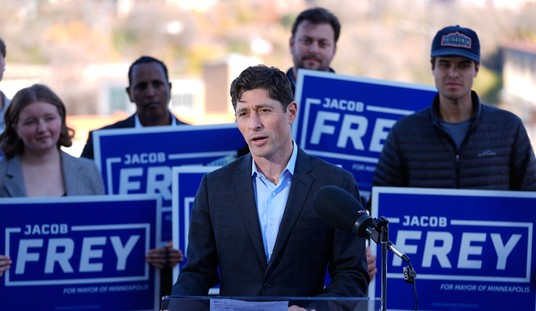After a day in which Democrats scapegoated Edward Liddy for paying AIG bonuses in which he had no hand in creating, Chris Dodd finally reversed his earlier denials and admitted that he inserted language into Porkulus that allowed the payouts. Dodd told CNN that the devil Tim Geithner made him do it (via Michelle):
Senate Banking committee Chairman Christopher Dodd told CNN’s Dana Bash and Wolf Blitzer Wednesday that he was responsible for adding the bonus loophole into the stimulus package that permitted AIG and other companies that received bailout funds to pay bonuses.
On Tuesday, Dodd denied to CNN that he had anything to do with the adding of that provision.
In other words, Dodd lied. He spent a full day lying to the American people, and now he’s trying to shift blame to others. He and his pal Barney Frank want to publicly name the people who received the bonuses authorized by Congress and this administration in an attempt to deflect blame for their own actions.
If Dodd had a shred of honor, he’d resign. If he had a shred of honor, though, we wouldn’t be in this mess.
Update: Here’s a transcript of Dodd spinning madly with CNN’s Dana Bash and Wolf Blitzer:
BASH: Well, this is an extraordinary moment because, I just want to actually point out to our viewers that our producer, Ted Barrett, asked if you knew anything about this clause that you put in just yesterday, and you said that you didn’t. You said you can’t point a finger at somebody who offered a change at all. But the Treasury Department is saying that it was at their behest, their concerns, but your staff actually did do this.
DODD: Well, listen to what happened here. We wrote the language in the bill to deal with bonuses, golden parachutes, excessive compensation — executive compensation, that was adopted unanimously by the United States Senate in the stimulus bill. That’s what I would have liked to have seen maintained in the bill, but for that language there would have been no language in the bill to deal with any of this at all, including language that allowed them to reach back.
The administration, it has been widely reported, had problems with that amendment, as others did as well. And they came and said, we’d like to modify that amendment. The alternative, frankly, was that happened to my amendment, what happened to the Wyden-Snowe amendment, and that is it be dropped altogether. I was vehemently opposed to that. That was not a confereed (ph) and have a void (ph) or a vote (ph) — vote or a voice in that conference. And so we agreed to the modification. However, the date is modified by saying the secretary, if there are any provisions dealing with bonuses that are inconsistent with the TARP or contrary to public interest, they ought to be allowed to reach back.
It’s on that clause the administration is now reaching back. So the modification occurred, it was at their suggestion. We wrote it together at the time, obviously, a month and a half ago. But again, I want to make the point, there many who were highly critical of the Dodd amendment on executive compensation, excessive compensation. I find it ironic that the very people who were critical of me putting that bill in a month-and-a-half ago are now being critical saying we went too far.
BASH: That may be true and I know…
DODD: … or not far enough.
BASH: I know Wolf has some questions. But if I could just follow up, just on this point, you were very adamant yesterday, very adamant that you didn’t know how this change got in there. And now you are saying that your staff did work with the administration.
DODD: Well, going back and looking — and obviously, I apologize to Ted and so forth, but the date is only significant to the extent, could it be modified. And the provisions we insisted upon, as even part of that discussion, was that the secretary, if in fact the law was inconsistent with those bonuses, are contrary to public interest, which I believe this is, and ironically it’s the administration relying on that section which is using that as a means by which they can reach back and try to get at these bonuses, which I’m confident we will.
So I’m very proud of the fact we wrote the language. Had we not written it, it wouldn’t be — we’d be debating (CROSSTALK) …
BASH: But you did agree to modify this, to put that clause in?
DODD: The alternative was losing, in my view, the entire section on executive excessive compensation. Given a choice, this is not an uncommon occurrence here, I agreed to a modification in the legislation, reluctantly. I wasn’t negotiating with myself here. I wasn’t changing my own amendment. I was changing the amendment because others were insistent upon it.
BASH: OK. I’m going to toss it over to Wolf. I know he has some questions.
BLITZER: All right. Senator, Dana, thank you. But, Senator, I think a lot of our viewers remain still a little bit confused. Some of them pretty confused. What I want to play for you, and I want to give you a chance to clarify precisely what’s going on. This is what you told our congressional producer, Ted Barrett, only yesterday. Listen to this.
(BEGIN VIDEO CLIP)
TED BARRETT, CNN CONGRESSIONAL PRODUCER: Because there’s the suggestion today being made that you received more money from AIG than any other senator. And that you were responsible for the February 11th, 2009, date. And so just — you know, again, I just want to get at — you’re saying you had nothing to do with that change?
DODD: Absolutely not.
BARRETT: And there was nothing you were doing that was aimed at protecting AIG…
DODD: No. Not at all. Not in the slightest. Absolutely.
BARRETT: … which is in your — which has offices — this particular office in the state of Connecticut?
DODD: Well, it does. But they (INAUDIBLE) — but the point is when that language left the Senate that I wrote, that was not included.
(END VIDEO CLIP)
BLITZER: All right. That was what you said yesterday, Senator. So go ahead and explain a little bit more precisely what changed from yesterday to today.
DODD: Well, going back and reviewing, obviously, and looking at it. But the point I want to make to you, Wolf, is, again, I would have preferred we kept my language as it left the Senate unanimously. In fact, there were objections when I wrote the language even before it left the Senate. I didn’t negotiate with myself with this amendment. I wasn’t trying to change it on my own, obviously, as has been pointed out by Dana. You had — the administration had expressed reservations about the amendment. They came to us and asked for modifications to the amendment. The alternative was, of course, losing the amendment entirely, which was a possibility.
I didn’t want to see that happen. I suspect we would be having a conversation tonight about why we didn’t include some language in here to deal with bonuses, golden parachutes and the like. It’s not uncommon for these modifications. I don’t believe anyone had any idea, I certainly didn’t, that a month-and-a-half later from February, we would be sitting here talking about AIG and the bonuses that they are receiving for their retentions, these $165 million.
So that was never a part of the consideration. And again, I apologize if I some confusion about whether or not we wrote it exactly. But I didn’t write at my own behest. I was being sought out and asked to modify this, with the alternative, candidly, being losing the amendment itself. In fact, even a few days after that you may recall that the administration suggested they were probably going to have to come back and maybe modify this even further. And again, as I said a moment ago, there were those who were highly critical.
In fact, the last month I’ve been highly criticized by many for including this kind of language in the bill at all. It’s somewhat ironic, as I said, that the very people who are critical of me putting in the language are now being critical that we weren’t restrictive enough.
BLITZER: Well, so just to be precise, what we’re talking about, this mysterious loophole that was inserted at the last minute that allowed these bonuses in effect — now these bonuses, $165 million, to go forward. What I hear you saying is that, you personally, you did this in order — at the request of officials at the Treasury Department, Timothy Geithner, among others.
DODD: Well, I didn’t say who it was. But just say this, I wouldn’t have modified my own amendment at my own insistence. I mean, I spent a long time to having people try to be — change it. And obviously they came. And the alternative was losing the amendment. And I didn’t think we should do that at all.
BLITZER: Who asked you at the Treasury Department to do it?
DODD: Well, they were people, obviously, coming and negotiating with the staffs back and forth. And I don’t know their names specifically, it was at a staff level, people were talking about it.
BLITZER: So it — but it wasn’t just your members of your own staff at the Senate Banking Committee who did this, you personally knew about it at the time, is that right?
DODD: No, I didn’t know the exact details. I knew they were coming with modifications to it, and whether or not we’d accept some. And again, the feeling we had, Wolf, on all of this, remember, the Wyden-Snowe amendment got dropped entirely dealing with the tax provisions. There were people who thought these provisions were unnecessary and unwarranted in the stimulus bill. We thought they were important. And that’s why we wrote the legislation. That’s why we insisted upon a vote on it. And I spoke on it on the floor of the Senate, the importance of it. And it was adopted unanimously by the Senate. When it got into conference, between the House and Senate, that’s when people stepped back up and sought modifications to it. And we agreed to go along with those at the time given the alternative, which was maybe to lose the entire provision.
BLITZER: And just what Dana was reporting, to be precise, the reason the Treasury Department asked you to do this was because what? They were afraid of lawsuits if you didn’t, is that right?
DODD: That was part of it. I think it was banks across the country and others worried about some of these contracts going to be difficult, that they would be lawsuits, there were arguments made along those lines. But I want you to also recognize, Wolf, as you read that language, that the language also says after that — the language about the date, that the Treasury has the right to go back, reach back, where there is inconsistency or in contrary to public interest. It’s that very clause on which the secretary or the Treasury tonight is relying on their ability to reach back and go after these bonuses.
BLITZER: Is there anything you can do now? Because there are more bonuses, more millions of dollars that are still supposed to go forward to AIG executives.
DODD: Well, there is, in fact, the Finance Committee, under the leadership of Senator Max Baucus, Chuck Schumer, and others, are working on language tonight to make it very difficult, if not impossible — to reach back into those and maybe any others. We’re also looking at some language we may want to add to that provision to make sure that it’s far-reaching enough. You’ll recall, Wolf, even back in September, when we had the emergency economic stabilization bill, we wrote and insisted upon dealing with executive compensation.
I can tell you tonight that those efforts were met with a lot of resistance. It isn’t just this administration. There has been a consistency about worried — about whether or not we’d have a brain drain, people would leave. You wouldn’t be able to hire good people to come in. People wouldn’t accept TARP money. A lot of various arguments were made about including this kind of a language. I’ve always felt that if you didn’t include this kind of a language, your ability to maintain the public confidence in what you were doing would be eroding.
And that’s exactly what has happened here, the public confidence in our ability to deal with these issues is being adversely affected, not just mildly, but seriously. So that’s why I insisted upon this language a month-and-a-half ago. And had I not insisted upon it, I suspect this evening you’d be saying to me as chairman of the Banking Committee, why didn’t you write something to that law?
BLITZER: So, Senator Dodd, with hindsight, knowing what you know now, the $165 million distributed to these top executives at AIG, when the Treasury Department came to you a month-and-a-half or so ago and said, insert this language to protect the U.S. government from lawsuits or whatever, should you have said no?
DODD: Well, the alternative might have been that the entire provision would have been lost, as I said. And that’s what happened with several provisions in the bill. And so the question at that moment is, do you take what’s seen at the time as relatively innocent modifications, no one was talking about AIG at all at this point, or do you end up taking some modifications that allow you to keep the substance of what you’re trying to accomplish?
BLITZER: The mystery has now been resolved. Senator, thanks very much for coming in.
DODD: Not at all, happy to…
BLITZER: Appreciate it very much, Senator Chris Dodd, the chairman of the Senate Banking Committee.
Yeah, a mystery’s been resolved — and it’s that Dodd outright lied. He’s trying to paint himself as some sort of saint now, but he lied, he lied on camera, and he lied repeatedly.
Chris Dodd is a liar.
Update II: Give CNN credit. They’re calling him a liar, too.







Join the conversation as a VIP Member